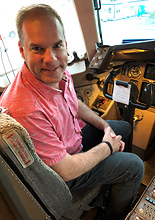DA alumnus Edward Brzytwa on his career since graduating from MAIS 07 in 2004
 What memories do you have of your time at the DA?
What memories do you have of your time at the DA?
There are so many! And they still feel fresh 17 years later. The defining current events of 2003-2004 anchor my memories: the accession of the new central and eastern member states into the European Union (a great cause for celebration at the DA at the time); the capture of Saddam Hussein (a shocking spectacle on CNN); and election of Arnold Schwarzenegger as the governor of California (a curiosity among the Austrian students seeking American perspective). Most of all I remember my DA classmates, a number of whom, through the power of social media, are still my friends to this day. I still feel connected to their lives and careers and try see them when they travel to DC or I travel to Brussels, which hopefully we can do again post-pandemic. I remember the classes and Professors, particularly the moments where I asked typically American/Socratic questions, often to the ire of the Professors, who likely were expecting silence and obedience. For the three semesters of the MAIS program, I read and learned as much as possible and soaked the culture of Vienna. Hopefully, I retain a fraction of that knowledge. And of course I remember the DA bar, parties, and balls (mostly). The class trips to Prague and Bosnia, ski trips to the Austrian Alps, and the occasional sojourn to Bratislava also resonate.
How did the DA prepare you for your career?
When I arrived at the DA, I had received my first Master Degree from the Middlebury Institute at Monterey a few months prior. So the pressure was off to an extent and I was able to enjoy the DA experience and educational and cultural opportunities in full. I could have started a career in the U.S. government, but instead chose the road less travelled by accepting a Fulbright grant to earn a MAIS degree. What prepared me for my career was living as an American in a multicultural environment, surrounded by an incredibly interesting, brilliant, and raucous crew of students. My interactions with my fellow students in one of the greatest cities in the world gave me a broader life perspective than I would have had otherwise. And it allowed me to see my colleagues as “people” as opposed to “nationalities”, which is a lesson that has aided me throughout my time in government and in the private sector, particularly after I shifted my work from the European arena to the Asia-Pacific. Plus, having a second Master Degree and a Fulbright grant look great on my resume.
What do you do for a living now and why did you choose this specific profession?
Today I am the lead international trade advocate for the American Chemistry Council (ACC), an industry association representing chemical manufacturers in the United States. This means I lead advocacy efforts on behalf of the U.S. chemical industry on international trade issues, negotiations, and policy. Frequently I work with industry and government representatives all over the world, including in Europe. Over the last three years, I have worked tirelessly to mitigate the damage of the trade wars on chemical manufacturers. Hopefully brighter days are ahead on that front and we can move away from confrontation and tariffs to liberalization and cooperation on the challenges of our time, including addressing climate change and achieving greater sustainability in world trade. Prior to my time at ACC, I was an international trade advocate at an information technology association for two years. My work in the private sector would not be possible without my 11 years as a trade negotiator with the U.S. government in both the Office of the U.S. Trade Representative and the U.S. Department of Commerce. I chose a career in international trade policy due to my fundamental belief that better trade relationships prevent conflict and foster peace, which really is the story of the European Union in the post WWII period. I hope that the current great powers can reflect on those lessons and do not fall into Thucydides traps.
What do you enjoy about your profession? What professional challenges fascinate you?
I enjoy working with amazing and interesting people from around the world. I enjoy traveling, having visited 45 countries on six continents for work and pleasure over the course of my life. I enjoy learning new industries, technologies, innovations, and science and the challenge of understanding and shaping the domestic and international policy environments of today and the future. The professional challenges that most fascinate me are policy issues - such as climate change or maintain the liberal international order in the face of corrosive state capitalism and authoritarianism - that require deep and dedicated cooperation on a global scale by stakeholders in government, industry, academia, and civil society.
What are your ambitions for the future?
My ambitions for the future include, but are not limited to: enabling my daughters Lila (age 6) and Cora (age 3) to be global citizens committed to the achieving the greater good in whatever role or capacity they serve; supporting my wife Mary in her career as an anaesthesiologist; continuing down the path of life-long learning; leading initiatives to correct for the mistakes of the past and pave the way for a more prosperous and sustainable future; serving in a global leadership role, whether in government, industry, international organizations, or academia; traveling to more countries, particularly in Africa and Latin America; bringing my family to the DA summer fest as many times as possible; building a vacation home in the mountains of western Maryland (what passes for mountains in Maryland anyway); buying a sailboat and racing it often; and skiing with my family and friends, whether in the U.S.
[April 2021]